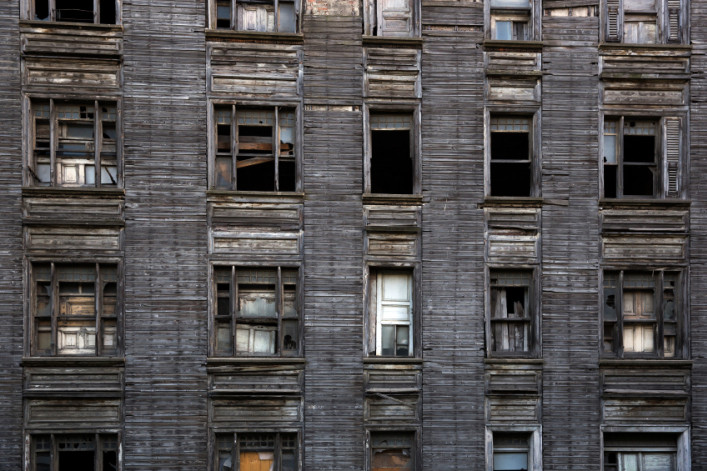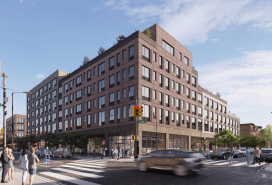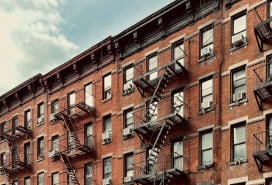It's not your fault: 9 reasons to blame the building if you can't get a mortgage

There are lots of factors that can affect your ability to obtain a mortgage for a new apartment—your income, your credit score, your bankruptcy or foreclosure history. (For more info, see 6 hurdles that can stand between you and your mortgage.)
And then there are those that have nothing at all to do with you. No matter how perfect it looks, the building itself might be standing between you and a mortgage. Here are some reasons that the building may prompt your lender to hit the reject button:
1. One person owns too many units
“If a single individual or entity owns more than 10% of the shares of stock in your co-op and you need a standard conforming Fannie Mae-insured loan, you’re out of luck,” says Vanessa Thatcher, a senior loan officer with Atlantic Home Capital. “Only a bank that has a portfolio lending program [where loans can be held on their own books] will lend you the money.”
The reason boils down to risk.
“Condos and co-ops rely on maintenance fees and if that one person is leveraged out and can’t pay for a while, that hurts the entire building,” says Thatcher.
2. Your building’s commercial space is more than 20% of the building’s total square footage
If your would-be digs share an address with a Whole Foods, a Banana Republic and a Citibank, running errands will be convenient, but you might run into problems when seeking a loan.
“Fannie Mae’s charter mandates that we purchase residential mortgages,” says Callie Dosberg, a rep for Fannie Mae. “To ensure compliance with our charter, we ensure condo and co-op projects are predominantly residential in composition.”
3. There's pending litigation against the building
While this one is a relative no-brainer, it should be noted that not all litigation will squash your mortgage. If, for example, it’s a cut-and-dried slip and fall case that will be covered by insurance, you’ll probably be fine. A co-op filing a lawsuit against delinquent unit owners is also acceptable, says Robbie Gendels, a senior loan officer at National Cooperative Bank.
But if the litigation points to a specific defect in the building itself, such as a faulty roof, it makes it that much harder for you to secure any financing.
“It depends on the litigation and how it’ll impact the building,” says Gendels.
4. The underlying mortgage will soon expire
If the original loan taken out by a co-op is due to run out in less than two years, you may run into some trouble when seeking a mortgage.
“It’s an issue with several lenders because when they refinance they could get a higher rate which will affect the financial status of the building,” says Julie Teitel of GuardHill Financial Corp.
5. The flip tax is too high
If the flip tax rate is 5% or higher, you might have some issues.
“Say you are buying a place for $1 million and getting an $800,000 loan. The building has a 5% flip tax, so it’s probably only worth $950,000. Now you can only get 80% on $950,000,” says Teitel. You may still get a mortgage--but it will be a smaller one than you had in mind.
6. There's no flood insurance
In higher risk flood zones, including coastal Manhattan and Brooklyn, lenders may require buyers to purchase flood insurance before closing on an apartment--even an apartment that's on the 30th floor, says apartment insurance broker Jeff Schneider of Gotham Brokerage. If the building doesn't have the proper flood documentation--including a survey called an elevation certificate--you won't be able to get flood insurance.
“Many coastal buildings either have the flood insurance your bank may require or at least this documentation, but if they don't, leave some time to get this done,” says Schneider. “Getting an elevation certificate on your own can cost $1,500 and take some time.”
7. Too many other unit owners also have mortgages from your bank
If a single lending agency is financing 20% of mortgages in a given building, they probably won’t do yours too.
“This is a financial caution” to avoid too much risk tied up in one building, says NCB's Gendels.
8. The building is too small
If the co-op you’re looking to buy into has fewer than five units, you’re out of luck when it comes to a Fannie Mae mortgage. The number is typically higher for portfolio lenders (usually 10-12), notes Thatcher.
9. Outdated window bars
Thatcher, who does a lot of business in Brooklyn, often comes across one problem that makes banks reluctant to part with their financing. Fortunately, this one is an easy fix.
“If there are bars on the bedroom windows that don’t have safety release latches, those are going to need to be removed completely or replaced with ones that do have safety release latches,” says Thatcher, noting that many banks are afraid that someone might get stuck in a room during a fire. “I’ve got a window bar guy that I recommend.”
Related posts:
6 hurdles that can stand between you and your mortgage -- and what to do about them
4 reasons why your apartment may no longer be mortgage-worthy
How to not get screwed by an appraiser
Top 12 questions New Yorkers ask their mortgage bankers


























